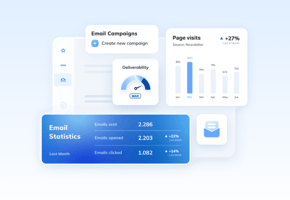In today's rapidly evolving business landscape, staying ahead of the curve is no longer a...
The Ultimate Guide to Choosing the Best Real Estate CRM Software Development Company
In the ever-evolving real estate market, leveraging technology is no longer optional—it’s a necessity. Real estate CRM software (Customer Relationship Management) has become an indispensable tool for real estate professionals aiming to manage their customer interactions, streamline processes, and ultimately, close more deals. But finding the right real estate CRM software development company can be daunting. This guide will help you navigate the selection process, ensuring you choose the best partner to meet your needs.
What is Real Estate CRM Software?
Real estate CRM software is designed to help real estate professionals manage their relationships with clients, leads, and contacts. It integrates various functionalities such as contact management, email marketing, task management, and transaction tracking into one cohesive system. This software allows agents and brokers to streamline their workflows, maintain client relationships, and enhance productivity.
The Importance of Real Estate CRM Software
In today’s competitive real estate market, managing customer relationships efficiently is crucial. Here’s why real estate CRM software is essential:
- Streamlined Communication: A CRM system ensures all communications are centralized, making it easier to keep track of interactions with clients.
- Efficient Lead Management: Automatically capture and categorize leads from various sources, ensuring no potential client slips through the cracks.
- Enhanced Productivity: Automate routine tasks, freeing up time for agents to focus on more critical activities.
- Improved Client Relationships: Maintain detailed records of client preferences and history, allowing for personalized service.
Key Features of Real Estate CRM Software
When choosing a real estate CRM software development company, ensure they can incorporate the following key features into the software:
- Contact Management: Efficiently store and manage contact information, including phone numbers, email addresses, and communication history.
- Lead Management: Track leads from initial contact through conversion, with tools to nurture relationships along the way.
- Automated Marketing: Features like email campaigns, social media integration, and follow-up reminders.
- Transaction Management: Track deals from listing to closing, ensuring all paperwork and steps are completed.
- Mobile Access: CRM systems should be accessible on-the-go, allowing agents to work from anywhere.
- Reporting and Analytics: Provide insights into sales performance, lead sources, and other critical metrics.
How to Choose the Right Real Estate CRM Software Development Company
Choosing the right development company is crucial to ensure your CRM system meets your needs and helps you achieve your business goals. Here are some steps to help you make the right choice:
1. Define Your Requirements
Before you start looking for a development company, clearly define what you need from your CRM software. Consider the following:
- The size of your team and how many users will need access.
- Specific features that are crucial for your operations.
- Your budget for development and ongoing maintenance.
- Integration requirements with existing tools and systems.
2. Evaluate Their Experience
Look for a company with a proven track record in developing real estate CRM software. Check their portfolio and ask for case studies or references from previous clients. An experienced company will understand the unique needs of the real estate industry and can offer valuable insights and recommendations.
3. Assess Their Technical Expertise
Ensure the company has the technical expertise to deliver a robust and scalable CRM system. They should be proficient in the latest technologies and development practices. Key technical aspects to consider include:
- Knowledge of CRM frameworks and platforms.
- Experience with cloud-based solutions.
- Ability to integrate with third-party tools and services.
- Mobile app development capabilities.
4. Consider Customization Options
Your real estate business has unique needs, and off-the-shelf solutions may not always suffice. Choose a development company that offers customization options to tailor the CRM software to your specific requirements. This ensures the software aligns perfectly with your business processes and goals.
5. Check Their Support and Maintenance Services
Post-deployment support and maintenance are crucial for the smooth functioning of your CRM system. Ensure the company provides reliable support services, including regular updates, bug fixes, and technical assistance. A company that offers ongoing maintenance can help you adapt the software as your business evolves.
6. Review Their Security Practices
Data security is paramount, especially when dealing with sensitive client information. Verify that the development company follows best practices for data security, including encryption, secure authentication, and regular security audits. This helps protect your data from breaches and ensures compliance with privacy regulations.
Benefits of Partnering with a Specialized Real Estate CRM Development Company
Working with a specialized real estate CRM software development company offers several advantages:
- Industry Expertise: A company that specializes in real estate CRM understands the specific challenges and needs of the industry, providing solutions that are more aligned with your business.
- Tailored Solutions: Specialized companies are better equipped to offer customized solutions that meet the unique requirements of your business.
- Faster Implementation: With their experience and focus, specialized companies can often deliver solutions more quickly and efficiently.
- Ongoing Support: Specialized companies are more likely to offer dedicated support and maintenance services tailored to real estate CRM systems.
Top Companies for Real Estate CRM Software Development
When looking for a real estate CRM software development company, consider the following top companies known for their expertise and reliable services:
1. Salesforce
Salesforce is a leading CRM platform with extensive experience in developing custom CRM solutions for various industries, including real estate. Their robust platform offers a wide range of features, and their development team can tailor solutions to meet your specific needs.
2. HubSpot
HubSpot offers a powerful CRM platform that is highly customizable. Their development team has experience creating solutions for the real estate industry, providing tools for lead management, marketing automation, and analytics.
3. Zoho
Zoho is known for its versatile CRM platform that can be customized for real estate businesses. They offer a range of tools and integrations that can help streamline your operations and improve client relationships.
4. Propertybase
Propertybase specializes in real estate CRM software, offering a comprehensive platform designed specifically for real estate professionals. Their solutions include features for lead management, marketing automation, and transaction management.
5. Pipedrive
Pipedrive provides a user-friendly CRM platform that is ideal for small to mid-sized real estate businesses. Their development team can customize the platform to suit your specific needs, helping you manage leads and deals more effectively.
Implementing Your Real Estate CRM: Best Practices
Once you’ve selected a real estate CRM software development company and your system is ready to go, follow these best practices for a successful implementation:
1. Provide Adequate Training
Ensure your team is well-trained on the new CRM system. Offer comprehensive training sessions and provide resources like manuals and video tutorials. A well-trained team will be more confident and efficient in using the new system.
2. Encourage Adoption
Promote the use of the CRM system across your team by highlighting its benefits. Show how it can make their jobs easier and help them achieve better results. Encourage feedback and make adjustments based on user input to improve the system’s usability.
3. Monitor Usage and Performance
Regularly monitor how the CRM system is being used and evaluate its performance. Use analytics and reporting tools to track key metrics, such as lead conversion rates and sales performance. This will help you identify areas for improvement and ensure the system is delivering the desired results.
4. Keep the System Updated
Regular updates are essential to keep your CRM system running smoothly and securely. Work with your development company to schedule regular updates and maintenance checks. This will help you stay ahead of potential issues and ensure your system continues to meet your needs.
5. Integrate with Other Tools
Ensure your CRM system integrates seamlessly with other tools and systems you use, such as email marketing platforms, social media channels, and accounting software. This will help streamline your workflows and improve overall efficiency.
Conclusion
Choosing the right real estate CRM software development company is a critical decision that can significantly impact your business’s success. By defining your requirements, evaluating potential partners based on their experience, technical expertise, and support services, you can find a company that will deliver a customized, reliable, and efficient CRM solution. Remember, a well-implemented CRM system can transform your real estate operations, helping you manage leads, improve client relationships, and ultimately close more deals. Take the time to make an informed choice, and you’ll reap the benefits for years to come.


